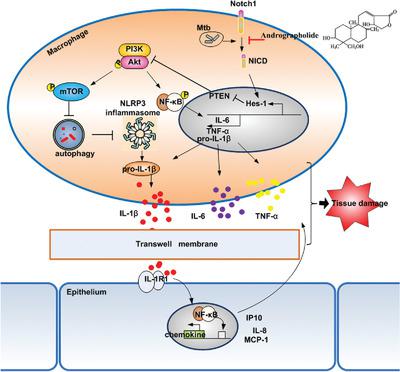当前位置:
X-MOL 学术
›
J. Leukoc. Biol.
›
论文详情
Our official English website, www.x-mol.net, welcomes your
feedback! (Note: you will need to create a separate account there.)
Andrographolide exerts anti‐inflammatory effects in Mycobacterium tuberculosis‐infected macrophages by regulating the Notch1/Akt/NF‐κB axis
Journal of Leukocyte Biology ( IF 3.6 ) Pub Date : 2020-09-29 , DOI: 10.1002/jlb.3ma1119-584rrr Weigang He 1 , Jinxia Sun 1 , Qingwen Zhang 1, 2 , Yinhong Li 1 , Yan Fu 1 , Yuejuan Zheng 1 , Xin Jiang 1
Journal of Leukocyte Biology ( IF 3.6 ) Pub Date : 2020-09-29 , DOI: 10.1002/jlb.3ma1119-584rrr Weigang He 1 , Jinxia Sun 1 , Qingwen Zhang 1, 2 , Yinhong Li 1 , Yan Fu 1 , Yuejuan Zheng 1 , Xin Jiang 1
Affiliation

|
Tuberculosis is a serious public health problem aggravated by the slow progress in the development of new anti‐tuberculosis drugs. The hyper‐reactive TB patients have suffered from chronic inflammation which could cause deleterious effects on their bodies. Therefore, it is imperative to develop an adjunctive therapy based on inflammatory modulation during Mycobacterium tuberculosis (Mtb) infection. The present study aims to investigate the immune regulatory effects of Andrographolide (Andro) on Mtb‐infected macrophages and its underlying mechanisms. The results showed that Andro inhibits the production of IL‐1β and other inflammatory cytokines in a dose‐dependent manner. The down‐regulation of IL‐1β expression causes the declining expression of IL‐8 and MCP‐1 in lung epithelial cells which were co‐cultured with Mtb‐infected macrophages. The inhibition of the activation of NF‐κB pathway, but not the inhibition of MAPK signaling pathway, accounts for the anti‐inflammatory role of Andro. Further studies elucidated that Andro could evoke the activation of autophagy to degrade NLRP3, which ultimately inhibited inflammasome activation and subsequent IL‐1β production. Finally, the relevant results demonstrated that Andro inhibited the Notch1 pathway to down‐regulate the phosphorylation of Akt/mTOR and NF‐κB p65 subunit. Taken together, Andro has been found to suppress the Notch1/Akt/NF‐κB signaling pathway. Both Akt inhibition‐induced autophagy and inhibition of the NF‐κB pathway contributed to restraining the activation of NLRP3 inflammasome and subsequent IL‐1β production. Then, the decreased production of IL‐1β influenced chemokine expression in lung epithelial cells. Based on these results, anti‐inflammatory effect of Andro in TB infection is merit further investigation.
中文翻译:

穿心莲内酯通过调节Notch1 / Akt /NF-κB轴对结核分枝杆菌感染的巨噬细胞发挥抗炎作用
结核是严重的公共卫生问题,新的抗结核药物开发进展缓慢。高反应性结核病患者患有慢性炎症,可能对他们的身体造成有害影响。因此,迫切需要开发一种基于结核分枝杆菌炎性调节的辅助疗法(MTB)感染。本研究旨在调查穿心莲内酯(Andro)对Mtb感染的巨噬细胞的免疫调节作用及其潜在机制。结果表明,Andro以剂量依赖的方式抑制IL-1β和其他炎性细胞因子的产生。IL-1β表达的下调导致与Mtb感染的巨噬细胞共培养的肺上皮细胞中IL-8和MCP-1的表达下降。抑制NF-κB途径的激活而不抑制MAPK信号传导的途径是Andro的抗炎作用。进一步的研究表明,Andro可以引起自噬激活以降解NLRP3,从而最终抑制炎症小体激活和随后的IL-1β产生。最后,相关结果表明,Andro抑制了Notch1通路,从而下调了Akt / mTOR和NF-κBp65亚基的磷酸化。综上所述,已发现Andro可抑制Notch1 / Akt /NF-κB信号通路。Akt抑制诱导的自噬和对NF-κB通路的抑制都有助于抑制NLRP3炎性小体的激活和随后的IL-1β产生。然后,IL-1β产量的下降影响了肺上皮细胞中趋化因子的表达。基于这些结果,值得进一步研究Andro对结核感染的抗炎作用。Akt抑制诱导的自噬和对NF-κB通路的抑制都有助于抑制NLRP3炎性小体的激活和随后的IL-1β产生。然后,IL-1β产量的下降影响了肺上皮细胞中趋化因子的表达。基于这些结果,值得进一步研究Andro对结核感染的抗炎作用。Akt抑制诱导的自噬和对NF-κB通路的抑制都有助于抑制NLRP3炎性小体的激活和随后的IL-1β产生。然后,IL-1β产量的下降影响了肺上皮细胞中趋化因子的表达。基于这些结果,值得进一步研究Andro对结核感染的抗炎作用。
更新日期:2020-11-25
中文翻译:

穿心莲内酯通过调节Notch1 / Akt /NF-κB轴对结核分枝杆菌感染的巨噬细胞发挥抗炎作用
结核是严重的公共卫生问题,新的抗结核药物开发进展缓慢。高反应性结核病患者患有慢性炎症,可能对他们的身体造成有害影响。因此,迫切需要开发一种基于结核分枝杆菌炎性调节的辅助疗法(MTB)感染。本研究旨在调查穿心莲内酯(Andro)对Mtb感染的巨噬细胞的免疫调节作用及其潜在机制。结果表明,Andro以剂量依赖的方式抑制IL-1β和其他炎性细胞因子的产生。IL-1β表达的下调导致与Mtb感染的巨噬细胞共培养的肺上皮细胞中IL-8和MCP-1的表达下降。抑制NF-κB途径的激活而不抑制MAPK信号传导的途径是Andro的抗炎作用。进一步的研究表明,Andro可以引起自噬激活以降解NLRP3,从而最终抑制炎症小体激活和随后的IL-1β产生。最后,相关结果表明,Andro抑制了Notch1通路,从而下调了Akt / mTOR和NF-κBp65亚基的磷酸化。综上所述,已发现Andro可抑制Notch1 / Akt /NF-κB信号通路。Akt抑制诱导的自噬和对NF-κB通路的抑制都有助于抑制NLRP3炎性小体的激活和随后的IL-1β产生。然后,IL-1β产量的下降影响了肺上皮细胞中趋化因子的表达。基于这些结果,值得进一步研究Andro对结核感染的抗炎作用。Akt抑制诱导的自噬和对NF-κB通路的抑制都有助于抑制NLRP3炎性小体的激活和随后的IL-1β产生。然后,IL-1β产量的下降影响了肺上皮细胞中趋化因子的表达。基于这些结果,值得进一步研究Andro对结核感染的抗炎作用。Akt抑制诱导的自噬和对NF-κB通路的抑制都有助于抑制NLRP3炎性小体的激活和随后的IL-1β产生。然后,IL-1β产量的下降影响了肺上皮细胞中趋化因子的表达。基于这些结果,值得进一步研究Andro对结核感染的抗炎作用。









































 京公网安备 11010802027423号
京公网安备 11010802027423号